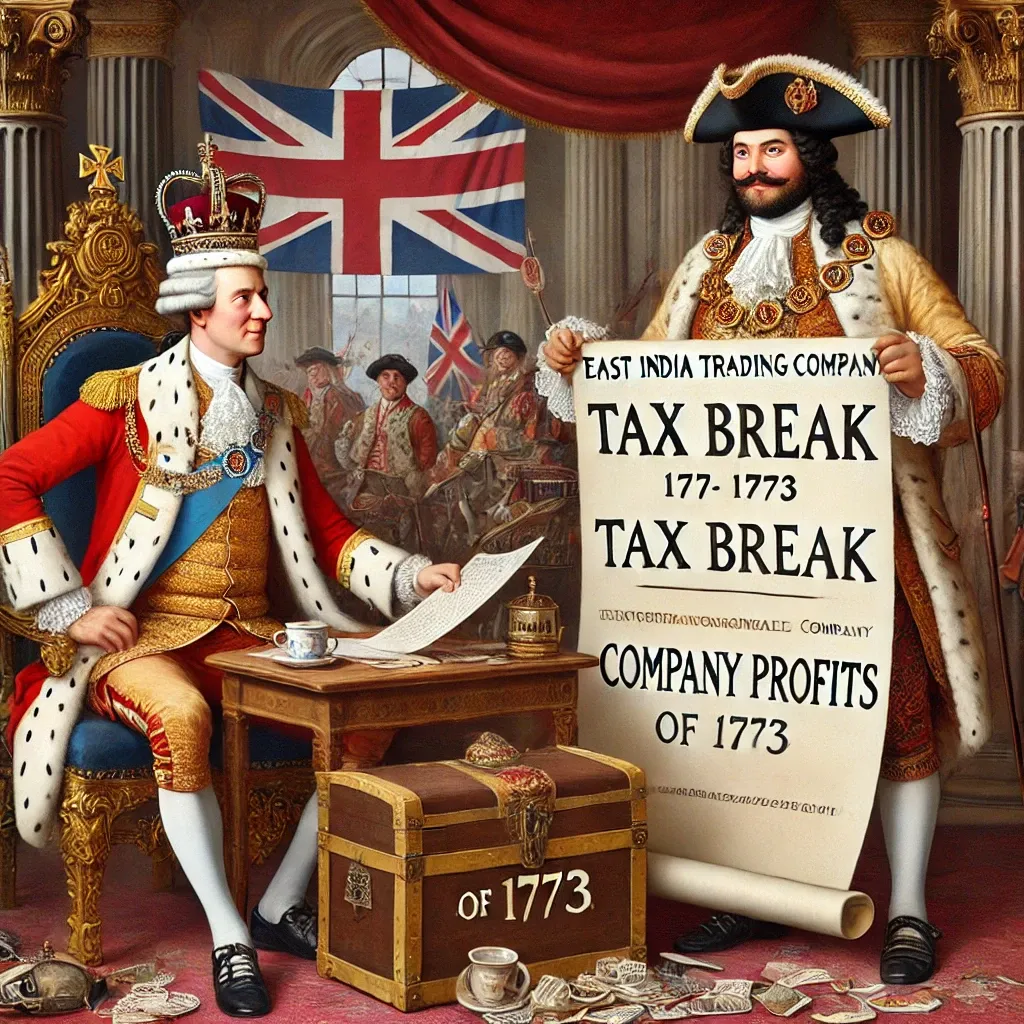The Failure of U.S.
The Failure of U.S. Politics to Uphold Moral Standards: Economic Inequality from the Boston Tea Party to the Present


The moral standards embedded in the Declaration of Independence, championed by the writings of John Adams, and demonstrated by the Boston Tea Party continue to be benchmarks against which American politics and economic policies should be measured. However, a cyclical pattern of economic policies has continually undermined these principles, leading to stark economic disparities, the concentration of wealth, and the erosion of workers’ rights. This historical pattern is evidenced in the Gilded Age, the Roaring Twenties, and the current era of neoliberal policies started by Reaganism, grown by Bush sr and perfected by Clinton. When our policies are defined with documents like the Powell Memo and Project 2025 vs the Declaration of Independence we have failed.
Historical Context: The Boston Tea Party
The Boston Tea Party was a pivotal event that marked the American colonies’ resistance to British tyranny and economic oppression. It was a direct response to the Tea Act of 1773, which granted the British East India Company a tax loophole and monopoly on tea sales in the colonies. Colonists viewed this as a form of corporate favoritism that violated their economic freedoms. The unfair privileges extended to the East India Company catalyzed the Boston Tea Party, igniting a broader movement that culminated in the Declaration of Independence.
John Adams, one of the key figures of the American Revolution, emphasized the responsibility of government to protect individual rights over corporate or business interests. Adams wrote:
“Government is instituted for the common good; for the protection, safety, prosperity, and happiness of the people; and not for profit, honor, or private interest of any one man, family, or class of men.”
The Gilded Age and the Rise of Corporate Power
The Gilded Age (1870s-1900s) was characterized by a concentration of wealth and power among a few industrialists known as “Robber Barons,” such as the Rockefellers, Vanderbilts, and Carnegies. Their immense fortunes were built through monopolistic practices, exploitation of natural resources, and mistreatment of workers. Laissez-faire economic policies enabled these magnates to influence politicians and legislation in their favor, prioritizing corporate interests over public welfare.
Key Features of the Gilded Age:
Monopolies and Trusts: Consolidation of industries into monopolistic trusts stifled competition and exploited workers.
Labor Exploitation: Hazardous working conditions, long hours, and low wages were prevalent.
Suppression of Labor Unions: Labor movements were met with fierce resistance and violence, often supported by government forces.
The Roaring Twenties and Economic Disparity
The Roaring Twenties (1920s) saw a return to laissez-faire economics, leading to a significant concentration of wealth among the elite while many workers faced stagnant wages and poor living conditions. The government took a hands-off approach to business regulation, which led to financial speculation and ultimately contributed to the Great Depression.
Key Features of the Roaring Twenties:
Stock Market Speculation: Unregulated markets led to speculative bubbles.
Labor Rights Ignored: Unions were weakened, working conditions remained poor, and wages stagnated.
Wealth Concentration: Corporate tax rates were low, allowing businesses and the wealthy to accumulate more profits and wealth.
Neoliberalism and Rising Inequality
In recent decades, neoliberal ideologies have revived concerns about unchecked corporate power, income inequality, and the erosion of workers’ rights. Neoliberalism emphasizes free-market capitalism, deregulation, privatization, and a reduced role of government in economic matters.
Key Features of Neoliberal Policies:
Tax Policy Favoring the Wealthy: Tax cuts for high-income earners and corporations (e.g., 2017 Tax Cuts and Jobs Act) reduced progressive taxation, exacerbating income inequality.
Deregulation: Financial deregulation led to the 2008 financial crisis and other market instabilities.
Globalization and Outsourcing: Free trade agreements facilitated outsourcing, leading to job losses in low-skilled manufacturing.
Weakening of Labor Unions: Anti-union measures reduced bargaining power, contributing to wage stagnation.
The Gilded Age, Roaring Twenties, and Neoliberalism: Echoes of Inequality
The parallels between the Gilded Age, the Roaring Twenties, and neoliberalism highlight a recurring pattern of economic inequality driven by corporate influence.
Labor Unions and Workers’ Rights:
Gilded Age: Unions were suppressed.
Roaring Twenties: Unions were marginalized.
Neoliberal Era: Union membership has declined, reducing workers’ bargaining power.
Wealth Concentration:
Gilded Age: “Robber Barons” controlled vast monopolies.
Roaring Twenties: Wealth was concentrated among the top 1%.
Neoliberal Era: The top 1% controls a growing share of national wealth.
Tax Policy:
Gilded Age: Favorable tax rates for businesses and the wealthy.
Roaring Twenties: Corporate tax rates were low.
Neoliberal Era: Tax loopholes, carried interest deductions, and offshore havens benefit corporations and the wealthy.
Failure to Uphold Moral Standards
The U.S. government’s failure to uphold the moral standards written into the Declaration of Independence is evident in the economic policies that have consistently favored corporate power over individual rights.
Corporate Personhood: The Citizens United ruling granted corporations the same First Amendment rights as individuals, allowing unlimited corporate political spending.
Taxes; Tax loopholes, carried interest deductions, and offshore havens benefit corporations and the wealthy.
Healthcare Costs: Market-driven healthcare reforms prioritized private insurance over universal coverage, leading to unequal access.
Educational Inequality: Privatization and rising tuition costs have limited access to quality education for low-income families.
Conclusion
The moral principles of equality, freedom, and justice have not been adequately upheld in the U.S., as evidenced by recurring patterns of economic inequality and corporate influence. The ideals espoused by John Adams and demonstrated in the Boston Tea Party remain relevant today. The government must realign its priorities to protect the rights and welfare of individuals over corporations, ensuring that economic policies promote social justice and reduce inequality.
As John Adams aptly noted:
“Government is instituted for the common good; for the protection, safety, prosperity, and happiness of the people; and not for profit, honor, or private interest of any one man, family, or class of men.”
This guiding principle should shape economic policy to ensure a fairer and more equitable future for all Americans.
